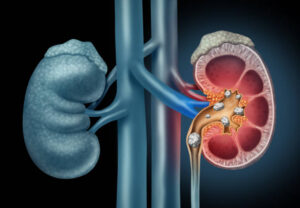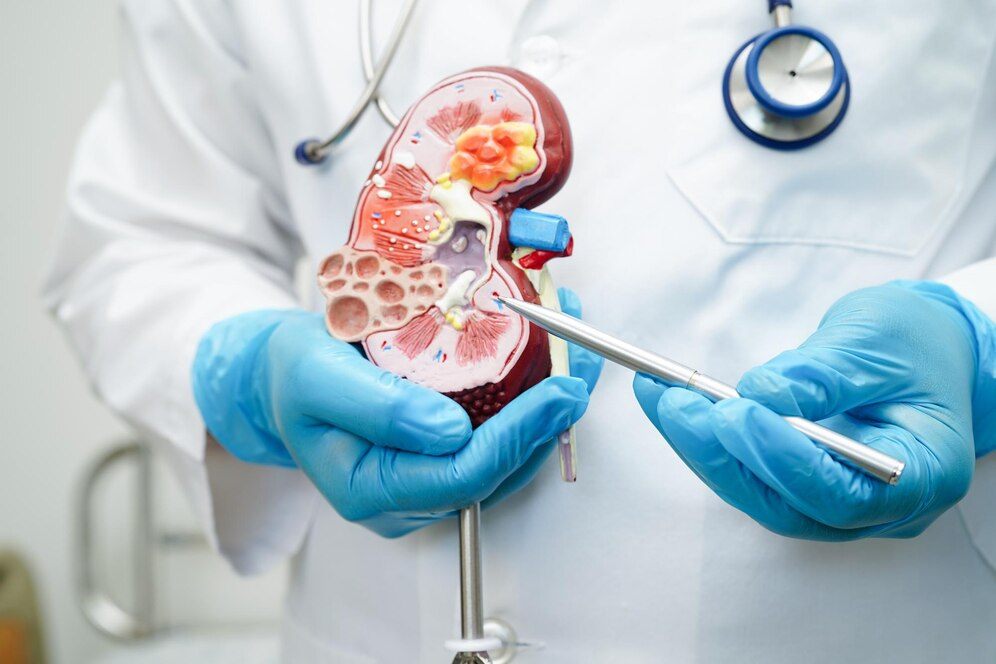Last updated on May 8th, 2025 at 04:07 pm
Kidney Stones Treatment – Kidney stones, medically known as nephrolithiasis or renal calculi, are hard mineral and salt deposits that form in the kidneys or urinary tract. These small, crystalline structures can cause intense pain and discomfort when they obstruct the normal flow of urine.
Kidney stones can be excruciatingly painful, and finding the right treatment is crucial for those who suffer from them.
Kidney Stones Treatment
The choice of kidney stone treatment depends on factors such as the stone’s size, type, location, and overall health. Here are the primary treatment approaches:
Watchful Waiting: This approach is often recommended for small kidney stones (less than 4mm) that are asymptomatic or cause only mild discomfort. Your doctor may advise increasing fluid intake and prescribing pain management medications. The goal is to allow the stone to pass naturally through the urinary tract.
Conventional Kidney Stone Treatment
When it comes to addressing kidney stones, conventional treatments are often the first line of defence. These methods include:
Medications
Medications can help manage pain and assist in the passage of smaller stones. Common medications include:
Pain Relievers: Over-the-counter or prescription pain medications can provide relief during stone passage.
Alpha-Blockers: These drugs relax the muscles in the ureter, making it easier for stones to pass.
Thiazide Diuretics: If calcium oxalate stones are recurrent, your doctor may prescribe diuretics to reduce calcium levels in the urine.
Extracorporeal Shock Wave Lithotripsy (ESWL)
ESWL is a non-invasive procedure that uses shock waves to break large stones into smaller fragments, making them easier to pass through urine. It is typically suitable for stones located in the kidney or upper ureter.
Ureteroscopy
Ureteroscopy is a minimally invasive procedure in which a thin, flexible tube is passed through the urinary tract to reach the stone. Specialized tools are used to break the stone into smaller pieces, which can then be removed or allowed to pass naturally.
Percutaneous Nephrolithotomy (PCNL)
PCNL is a surgical procedure reserved for large stones or those that cannot be effectively treated with less invasive methods. It involves making a small incision in the back to access the kidney and remove or break down the stone.
> Consult a doctor and Order Medicine Online
Kidney Stone Laser Treatment
A more advanced approach to kidney stone treatment involves laser technology. Laser treatment offers precise targeting and minimal invasiveness. Here’s how it works:
Laser Lithotripsy: This procedure utilizes laser technology to precisely target and break kidney stones into smaller fragments. Laser lithotripsy is particularly effective for hard stones and can be performed through a ureteroscope.

Kidney Stone Laser Treatment Side Effects
While kidney stone laser treatment is generally safe, it’s essential to be aware of potential side effects:
Minimal Side Effects: Unlike some traditional methods, kidney stone laser treatment often results in fewer side effects, making it an attractive option for many patients.
Temporary Discomfort: Some patients may experience mild discomfort or pain after the procedure.
Bleeding: Minimal bleeding in the urine is possible but usually resolves within a few days.
Infection Risk: As with any medical procedure, there is a slight risk of infection, but this is relatively rare.
Shock Wave Lithotripsy (SWL): SWL is a variation of ESWL that uses fewer shock waves but over a more extended period. It can be a suitable option for certain patients.
Read: What are Generic Medicines?
Kidney Stone Ayurvedic Treatment
In Ayurvedic terms, kidney stones are often associated with an imbalance in the “doshas,” which are the fundamental energies that govern an individual’s physical and mental well-being.
Kidney stones are believed to result from an excess of certain doshas, particularly “Vata” and “Pitta,” along with the accumulation of toxins or “ama” in the body. These imbalances can lead to the formation of stones in the kidneys. Here are key aspects of kidney stone Ayurvedic treatment:
1. Balancing the Doshas
Ayurvedic practitioners work to balance the doshas, primarily Vata and Pitta, through dietary recommendations and lifestyle adjustments. These may include the incorporation of warm, nourishing foods and spices to calm Vata and cool Pitta.
2. Hydration
Proper hydration is emphasized in Ayurveda to help flush out toxins and prevent stone formation. Drinking warm water with lemon or herbal infusions is often recommended.
3. Herbal Remedies
Ayurvedic herbs play a significant role in kidney stone treatment. Some commonly used herbs include:
Punarnava: Known for its diuretic properties, it helps in reducing swelling and inflammation.
Gokshura: A natural tonic for the urinary system, it can help prevent stone formation.
Varuna: It is believed to dissolve kidney stones and promote their elimination.
4. Dietary Modifications
Ayurvedic dietary guidelines emphasize the consumption of foods that are easy to digest and gentle on the kidneys. This includes incorporating fresh fruits, vegetables, and whole grains while avoiding excessive intake of animal proteins, spicy foods, and foods high in oxalates.
5. Yoga and Meditation
Yoga and meditation are considered integral to Ayurvedic kidney stone treatment. These practices help reduce stress, improve overall health, and support the balance of doshas.
6. Panchakarma Therapy
Panchakarma is a detoxification therapy in Ayurveda that may be recommended for individuals with kidney stones. This process involves various cleansing procedures to eliminate toxins from the body.
Caution and Consultation
While Ayurvedic kidney stone treatment can be effective and safe, it is essential to consult with a qualified Ayurvedic practitioner before beginning any treatment plan. They will assess your specific constitution (Prakriti) and the nature of your kidney stones to create a personalized treatment approach.
Kidney Stone Treatment Without Surgery
Surgery can be daunting, but there are non-surgical options to explore:
High Fluid Intake: Drinking plenty of water can help flush out small kidney stones naturally.
Prescription Medications: Your doctor may prescribe medications that encourage the passage of kidney stones without surgery.
Kidney Stone Treatment at Home
Taking care of your kidneys at home can complement medical treatments. Here’s how:
Hydration: Maintain proper hydration by drinking water regularly throughout the day.
Dietary Choices: Opt for a kidney-friendly diet, which includes foods low in oxalates and sodium.
Kidney stones can be excruciatingly painful, making prompt and effective treatment essential. Fortunately, there are various kidney stone treatment options available, ranging from conservative measures to medical procedures.
Conclusion:
Dealing with kidney stones can be challenging, but with the right treatment approach, you can alleviate the pain and discomfort they bring. Whether you opt for a conventional method, Ayurveda, laser treatment, or home remedies, it’s essential to consult with a healthcare professional who can guide you toward the best solution for your specific situation.
Remember that early intervention and lifestyle modifications can also play a significant role in preventing kidney stones from forming in the first place. For a healthier future, explore your options and take steps to protect your kidneys.
FAQs on Kidney Stone Treatment
Q1. What Are the Common Symptoms of Kidney Stones?
Kidney stone symptoms can vary, but common signs include severe lower back or abdominal pain, pain radiating to the groin, frequent urination, blood in the urine (hematuria), nausea, and vomiting. If you undergo these symptoms, it’s essential to seek medical attention promptly.
Q2. Is Surgery Always Necessary to Remove Kidney Stones?
No, surgery is not always necessary. Many kidney stones can pass naturally with appropriate hydration and pain management. Medical treatments like extracorporeal shock wave lithotripsy (ESWL) and ureteroscopy can also be effective in breaking down and removing stones without surgery. The choice of treatment depends on factors such as stone size, location, and composition.
Q3. How Can I Prevent Kidney Stones from Recurring?
Preventing the recurrence of kidney stones involves making dietary and lifestyle changes. Some key steps include:
- Drinking plenty of water to stay well-hydrated.
- Reducing the intake of foods high in oxalates, sodium, and animal proteins.
- Monitoring your calcium intake to ensure it’s within recommended limits.
Following your healthcare provider’s recommendations, including any prescribed medications, to manage underlying conditions that contribute to stone formation.
